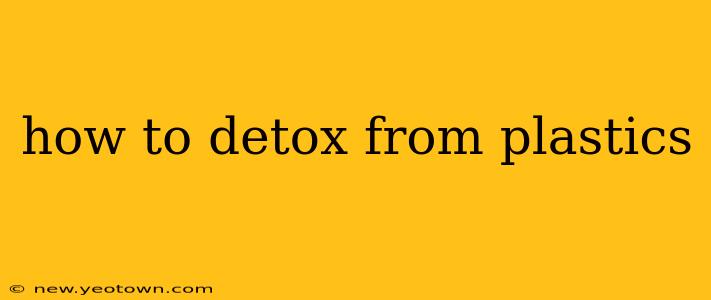How to Detox From Plastics: A Journey Towards a Healthier Planet and You
Our modern world is saturated with plastic. It’s in our food packaging, our clothes, our electronics – even our water bottles. While convenient, this pervasive reliance on plastic has significant consequences for both our health and the environment. But the good news is, you can take steps to significantly reduce your plastic footprint, embarking on a "plastic detox" that benefits you and the planet. This isn't about perfection; it's about conscious choices and gradual change. Let's begin this journey together.
What are the health concerns linked to plastic exposure?
This is a crucial question, and the answer isn't always straightforward. The long-term effects of plastic exposure on human health are still being researched, but there are several areas of concern. Some plastics contain chemicals like BPA and phthalates, which are endocrine disruptors—meaning they can interfere with your hormones. Studies have linked these chemicals to potential reproductive issues, developmental problems, and certain types of cancer. Microplastics, tiny plastic particles found everywhere from our oceans to our food, are also a growing concern, with researchers still investigating their potential impact on human health.
What are the environmental impacts of plastic?
The environmental consequences of our plastic consumption are undeniable. Plastic pollution is choking our oceans, harming wildlife, and contributing to climate change. The sheer volume of plastic waste generated globally is overwhelming, and much of it ends up in landfills or polluting our ecosystems. Furthermore, the manufacturing process of plastic itself is energy-intensive and contributes to greenhouse gas emissions.
How can I reduce my plastic use in the kitchen?
The kitchen is often a plastic hotspot. Here's how to make a difference:
- Ditch single-use plastics: Say goodbye to plastic wrap, ziplock bags, and disposable cutlery. Invest in reusable alternatives like beeswax wraps, silicone bags, and bamboo utensils.
- Choose glass or stainless steel containers: Opt for glass or stainless steel containers for storing food instead of plastic containers.
- Buy produce without plastic packaging: Shop at farmers' markets or choose loose produce whenever possible. Bring your own reusable bags.
- Say no to plastic bottled water: Invest in a reusable water bottle and refill it throughout the day. Consider a water filter if you're concerned about tap water quality.
What are some easy swaps for everyday plastic items?
Many everyday items have readily available, plastic-free alternatives:
- Shopping bags: Keep reusable shopping bags in your car and purse.
- Straws: Use reusable metal or bamboo straws.
- Coffee cups: Invest in a reusable travel mug.
- Personal care products: Look for products packaged in glass or aluminum, and consider making your own.
- Cleaning supplies: Choose refill options or brands that offer plastic-free packaging.
How can I reduce plastic waste when I'm on the go?
Staying plastic-free when you're out and about requires a bit more planning:
- Pack your own lunch: Use reusable containers for food and snacks.
- Carry a reusable water bottle and coffee cup.
- Bring your own bags to the grocery store.
- Refuse plastic straws and cutlery at restaurants.
How can I recycle plastic properly?
Recycling is an important part of reducing plastic waste, but it's not a silver bullet. Different types of plastic have different recycling capabilities, and not all plastics are actually recycled. Check your local recycling guidelines to understand what types of plastic are accepted in your area and how to sort them properly.
Is there a way to completely eliminate plastic from my life?
Completely eliminating plastic from your life is challenging in our current society, but striving for significant reduction is entirely achievable. The key is to make conscious choices, prioritize reusable alternatives, and support companies that are committed to reducing their plastic footprint. Remember, every small step counts.
This journey to detox from plastics is a marathon, not a sprint. Start with small changes, gradually incorporate more sustainable practices, and celebrate your progress along the way. You'll not only be helping the environment, but you'll also be making healthier choices for yourself.

